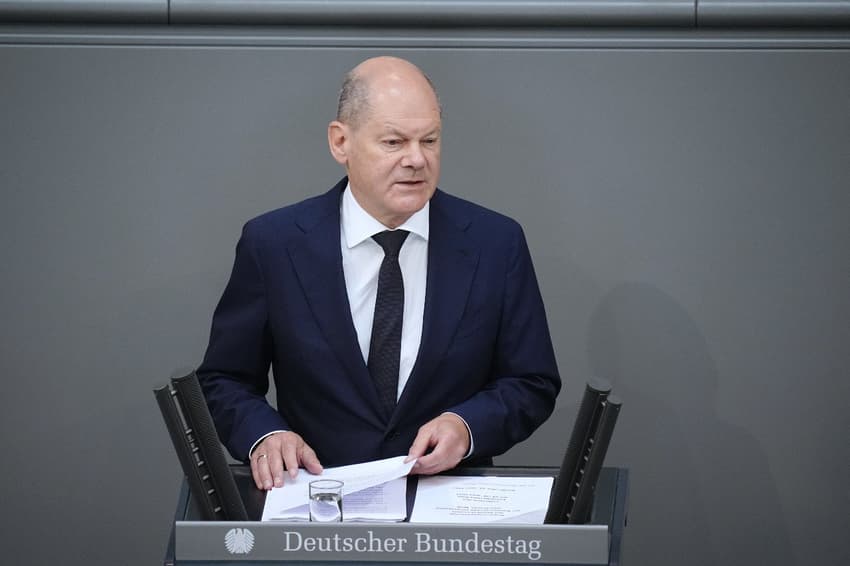Germany to meet NATO's 2 percent spending goal 'starting next year'

Germany will meet NATO's two-percent spending target from next year, Chancellor Olaf Scholz said Thursday, after Russia's war in Ukraine sparked a major policy shift on defence in Berlin.
"We will ensure that the Bundeswehr finally receives the equipment it needs... also by spending two percent of our GDP on defence for the first time in decades, starting next year," Scholz told lawmakers in parliament.
Germany's defence spending has reached only around 1.5 percent in the last years, but Russia's war in Ukraine has sparked a major policy shift in Berlin.
Besides sending armaments to Ukraine, Germany is going on a military spending spree to replenish its worn-out stocks, from fighter jets to tanks to air defence systems.
Last Thursday, June 14th, German lawmakers approved an advance payment for the purchase of the sophisticated Arrow 3 air defence system from Israel for nearly €4 billion.
In December, the country signed a contract to buy dozens of US-made F-35 planes, often called 'the world's most advanced' fighter jets.
READ ALSO: Why is NATO's historic air defence drill so important for Germany?
Other NATO agenda items
Scholz on Thursday also urged NATO leaders meeting in Vilnius in July to focus on ramping up Ukraine's fighting capacity during its ongoing counteroffensive against Russia.
A key question to be raised at the gathering on July 11-12th will be the future relationship between Ukraine and NATO, Scholz said.
"We should look soberly at the current situation," Scholz told lawmakers in Berlin, noting that Kyiv "has itself said that a NATO membership is not in the question while Russia is carrying out its war against Ukraine".
"That's why I am putting forward that we focus in Vilnius on what is now an absolute priority -- that is, to strengthen the fighting power of Ukraine."
Parallel to that, Scholz said Germany will work with the G7 and EU partners as well as Kyiv to work out "effective and long-term security commitments".
These will ensure that Ukraine gets sustained military support as well as the necessary economic strength to defend itself against Russian aggression, he added.
The Vilnius talks, he said, will send a "strong signal" of transatlantic cooperation and determination.
Comments
See Also
"We will ensure that the Bundeswehr finally receives the equipment it needs... also by spending two percent of our GDP on defence for the first time in decades, starting next year," Scholz told lawmakers in parliament.
Germany's defence spending has reached only around 1.5 percent in the last years, but Russia's war in Ukraine has sparked a major policy shift in Berlin.
Besides sending armaments to Ukraine, Germany is going on a military spending spree to replenish its worn-out stocks, from fighter jets to tanks to air defence systems.
Last Thursday, June 14th, German lawmakers approved an advance payment for the purchase of the sophisticated Arrow 3 air defence system from Israel for nearly €4 billion.
In December, the country signed a contract to buy dozens of US-made F-35 planes, often called 'the world's most advanced' fighter jets.
READ ALSO: Why is NATO's historic air defence drill so important for Germany?
Other NATO agenda items
Scholz on Thursday also urged NATO leaders meeting in Vilnius in July to focus on ramping up Ukraine's fighting capacity during its ongoing counteroffensive against Russia.
A key question to be raised at the gathering on July 11-12th will be the future relationship between Ukraine and NATO, Scholz said.
"We should look soberly at the current situation," Scholz told lawmakers in Berlin, noting that Kyiv "has itself said that a NATO membership is not in the question while Russia is carrying out its war against Ukraine".
"That's why I am putting forward that we focus in Vilnius on what is now an absolute priority -- that is, to strengthen the fighting power of Ukraine."
Parallel to that, Scholz said Germany will work with the G7 and EU partners as well as Kyiv to work out "effective and long-term security commitments".
These will ensure that Ukraine gets sustained military support as well as the necessary economic strength to defend itself against Russian aggression, he added.
The Vilnius talks, he said, will send a "strong signal" of transatlantic cooperation and determination.
Join the conversation in our comments section below. Share your own views and experience and if you have a question or suggestion for our journalists then email us at [email protected].
Please keep comments civil, constructive and on topic – and make sure to read our terms of use before getting involved.
Please log in here to leave a comment.